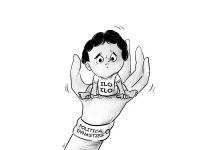[av_one_full first min_height=” vertical_alignment=” space=” custom_margin=” margin=’0px’ padding=’0px’ border=” border_color=” radius=’0px’ background_color=” src=” background_position=’top left’ background_repeat=’no-repeat’ animation=”]
[av_heading heading=’Hypocritical religiosity’ tag=’h3′ style=’blockquote modern-quote’ size=” subheading_active=’subheading_below’ subheading_size=’15’ padding=’10’ color=” custom_font=”]
BY HERBERT VEGO
[/av_heading]
[av_textblock size=” font_color=’custom’ color=’#0a0a0a’]
Tuesday, February 7, 2017
[/av_textblock]
[av_textblock size=” font_color=’custom’ color=’#0a0a0a’]
ALMOST half of the front page of a Manila daily yesterday displayed a solemn President Rodrigo Deterte. He was praying, its caption said, before the tomb of his mother. In life, the late Soledad Duterte was a dyed-in-the-wool Roman Catholic.
That picture was out of sync with how the President has been portraying the Catholic Church – as the “most hypocritical institution interfering in state affairs.”
How could the President appear so religious and yet so disdainful of the Church?
To put it simply, hypocrisy lurks in religiosity. Most Filipinos are nominal, not practicing, Christians. Why, for example, do Christians in the House echo the wish of the President to pass the death penalty bill into law when they know it’s un-Christian? I dread to think that it’s for material rather than spiritual reward.
I have turned my back on religion precisely because of my doubt on its credibility.
Christianity alone has a thousand and one denominations to choose from. A lifetime would not suffice to sort the grain from the chaff.
The Latin saying, “Vox populi, vox Dei” could not be right. If the voice of the majority of Filipinos were the voice of God, then Roman Catholicism would be “it” because most of us are Roman Catholics.
But that “voice” does not represent the world majority!
Why should we even embrace it as our own when history tells us that it was actually foisted on us by the oppressive Spanish conquistadors? If Ferdinand Magellan had not landed in the Philippines on March 16, 1521, this nation could have remained pro-anito or could have turned predominantly Muslim like Indonesia and Malaysia because, by then, our southern natives had already known Allah.
If we were born in a Muslim theocracy where the Bible is banned – as in Saudi Arabia – no doubt we would also condemn the “evil Christians.”
But we don’t even have to move out of Christianity to discover how convoluted religion could be. There was a time when, as mayor of Davao City, Duterte would often show up at the indoctrination services of Pastor Apollo Quiboloy, who was presenting himself as “appointed son of God.” I thought Quiboloy had won Duterte into his flock.
When Duterte ran for President in May 2016, he barnstormed the country using Quiboloy’s airplane. Of course, the “Quiboloyans” voted solidly for him.
Since then, I have not heard the new President mention the name of Quiboloy.
The pastor has opted to “never mind.” He is still visible on the powerful TV media. With tithe money pouring in from convinced followers, he has built himself a “paradise” on a Davao mountain top. The unconvinced, of course, think of his organization as just another cult.
There are non-priests who advertise themselves as Roman Catholic servant-leaders and establish so-called “fellowship” organizations. Naturally, they draw gullible Catholics to their prayer rallies and collect from them sacks of tax-free “love offerings.”
The goal of the religious follower is to gain eternal life while that of the cult leader is to gain money. While the follower waits for the fulfillment of his elusive goal, the leader has already achieved his.
No wonder there’s a popular joke on three lords who make fast and tax-free money: the drug lord, the gambling lord and the “praise the lord.”
The flood of money cascading from millions of followers has fueled the rise of many religion founders. You must have read that when the Korean founder of the Unification Church (since 1954), Reverend Sun Myung Moon, died in September 2012, he had amassed billions of US dollars from five million adherents worldwide.
Religious organizations also make money from politicians, mostly crooked, who generously “donate” – or “invest” – in exchange for their blocked votes.
Unfortunately, recipients of the “donations” do not even succeed in straightening their crooked donors. If Filipino politicians, indeed mostly church-goers, were true Christians, why does graft and corruption prevail in the Philippines?
To quote Henry David Thoreau: “Any fool can make a rule and every fool will mind it.”
Fortunately, one can still believe in God outside of any religious organization. /PN
[/av_textblock]
[/av_one_full]







